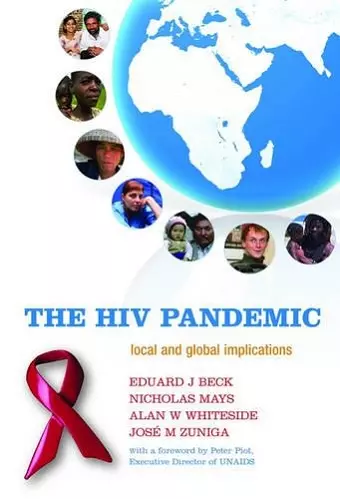The HIV Pandemic
Local and global implications
Peter Piot author Nicholas Mays editor José M Zuniga editor Eduard J Beck editor Alan W Whiteside editor
Format:Hardback
Publisher:Oxford University Press
Published:18th May '06
Currently unavailable, and unfortunately no date known when it will be back
This hardback is available in another edition too:
- Paperback£39.99(9780199237401)

As we approach the 25th anniversary of the first recognition of HIV/AIDS in 1981, this book reflects on the international impact of the disease. It has persistently remained a global issue, with more than 50 million people worldwide estimated to have been infected since that date. This ambitious book, written by 165 authors from 30 countries, offers a multi-country comparative study that examines how the response to the common, global threat of HIV is shaped by the history, culture, institutions and health systems of the individual countries affected. Increasingly the shift of health systems has been from prevention only as the main containment strategy, to a strategy that includes scaling up HIV treatment, and care and prevention services, including antiretroviral therapy. Thus, all parts of the health system must be involved; policy makers, healthcare professionals and users of the services have been forced to think differently about how services are financed, how resources are allocated, how systems are structured and organized, how services are delivered to patients, and how the resulting activity is monitored and evaluated in order to improve the effectiveness, efficiency, equity and acceptability of the response. This book is unique in attempting to describe and assess a range of responses across the globe by situating them within the characteristics of each country and its health system. Most chapters combine a health policy expert with an HIV specialist, allowing both a 'top down' health system approach and a 'bottom up' HIV-specific perspective. There are thematic and analytical sections, which provide an overview and some suggestions for solutions to the most serious outstanding issues, and chapters which analyse specific country and organisational responses. There is no perfect health system, but the evidence provided here allows the sharing of knowledge, and a opportunity to assess the impact and reactions, to an epidemic that must be considered a long term issue.
Overall, this is an informative and interesting book, with the case studies from the different countries being particularly interesting. It will serve as a valuable resource to individuals working for international agencies, donors and researchers in providing important background information on the HIV pandemic. * WHO Bulletin *
A particular strength of the book is the contributions of a diverse range of experts from across the globe and the structure and organization of the chapters. This is a timely and useful text for donors, policy makers, program managers, students and public health practitioners. * HIV Clinical Trials *
...once I plunged in, I was hooked. The book is well structured, readable, informative and challenging. * Nursing Standard *
This book is timely for framing the first 26 years of the epidemic from a perspetive that encompasses policy and the delivery of medical care...The in-depth, well-organised country reports provide a baseline that will serve particularly well for those interested in international policy issues in public health...this book is important, and perhaps the best of its kind. * Lancet, Vol. 368 *
ISBN: 9780198528432
Dimensions: 253mm x 175mm x 49mm
Weight: 1579g
840 pages